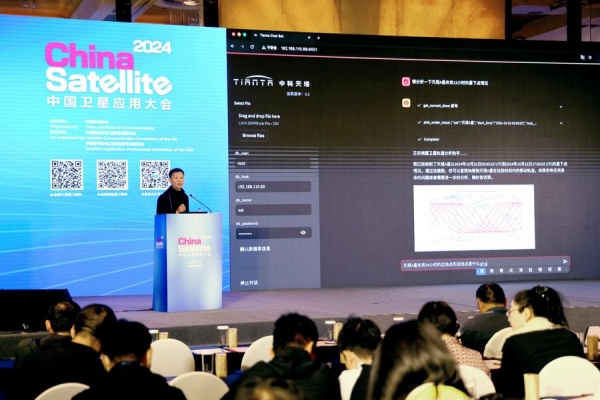
- Home
- Media Center
- Events
- Membership
-
Reports
- Collection of cases on Jointly Building a Community with a Shared Future in Cyberspace
- Collection of Shortlisted Achievements of World Internet Conference Awards for Pioneering Science and Technology
- Reports on Artificial Intelligence
- Reports on Cross—Border Ecommerce
- Series on Sovereignty in Cyberspace Theory and Practice
- Other Achievements
- About WIC
- 中文 | EN

Chinese firm unveils AI-powered model for satellite management

Dong Weihua, CTO of the CasTianta Tech Co., Ltd., introduces Huashan, a specialized Large Language Model for the space sector, at the China Satellite Application Conference held by the China Institute of Communications in Beijing, capital of China, Oct. 25, 2024. [Photo provided to Xinhua]
BEIJING -- A Chinese tech company has adopted artificial intelligence (AI) to improve the efficiency and reliability of spacecraft management by developing a specialized Large Language Model (LLM) for the space sector.
CasTianta Tech Co., Ltd., an enterprise engaged in the research and industrialization of products related to the management of commercial satellites, unveiled the LLM, Huashan, on Friday at the China Satellite Application Conference, which is held by the China Institute of Communications in Beijing.
Describing the functionality of the LLM, the company's CTO, Dong Weihua, explained that Huashan leverages AI to assist users in intelligent spacecraft control, orbit calculation and analysis, and command code generation, thereby ensuring smooth satellite operations in orbit.
Built on satellite management expertise, this model provides a platform for spacecraft management, personnel training and intelligent satellite control through voice and text interaction, according to Dong.
Effective satellite management is a crucial link in ensuring the rational utilization of satellite resources, stable and reliable satellite services, and supporting further development of satellite technology, Dong said.
Once a satellite is launched, it transmits massive amounts of data back to the ground. However, a single engineer can manage only a limited number of satellites, while the number of satellites in orbit is rapidly expanding. Current manpower will not be able to meet this growing demand, Dong explained.
According to statistics from CCID Consulting, the global satellite industry has grown rapidly since 2020, with the average annual growth rate of satellite launches reaching 32 percent from 2020 to 2023.
"When traditional working methods fall short of meeting demands, leveraging AI effectively becomes essential to address the magnitude of changes in satellite management. This is precisely the vision behind our development of Huashan," Dong said.

The World Internet Conference (WIC) was established as an international organization on July 12, 2022, headquartered in Beijing, China. It was jointly initiated by Global System for Mobile Communication Association (GSMA), National Computer Network Emergency Response Technical Team/Coordination Center of China (CNCERT), China Internet Network Information Center (CNNIC), Alibaba Group, Tencent, and Zhijiang Lab.





